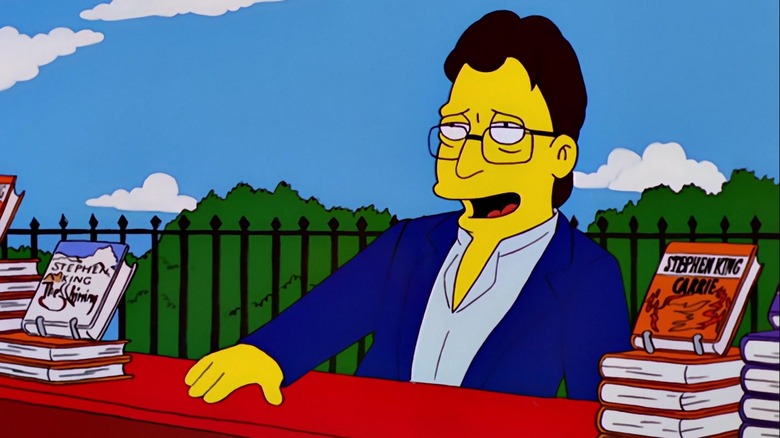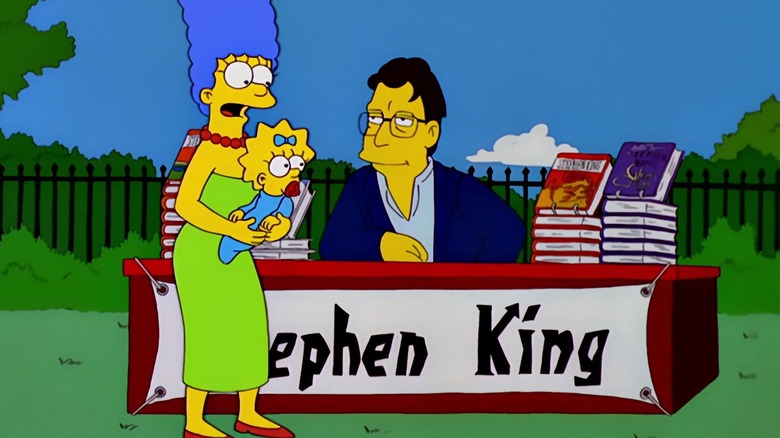One Of The Worst Episodes Of The Simpsons Has A Stephen King Cameo
In the "Simpsons" episode "Insane Clown Poppy" (November 12, 2000), Bart (Nancy Cartwright) and Homer (Dan Castellaneta) are playing with fireworks and accidentally destroy the interior of Lisa's bedroom. To make it up to Lisa (Yeardley Smith), Homer takes the family to a local book fair, something Lisa gets very excited about. In attendance at the fair are multiple celebrity authors, including Amy Tan and John Updike, who give cameo performances as themselves. Amusingly, when Tom Wolfe's clean white suit is stained, he rips it away like a stripper costume to reveal another clean white suit underneath.
Also at the fair is Stephen King, who, like Tan and Updike, was game enough to voice himself. Marge (Julie Kavner) asks if King is working on a new horror novel, and King says no and that he has instead pivoted to a biography of Benjamin Franklin. Naturally, when King begins describing Franklin's life, it becomes a horror story pretty quickly. ("That key he tied to the end of a kite? It opened the gates of Hell!")
King doesn't appear in the rest of the episode, as the story ultimately focuses on Krusty the Clown (Castellaneta) and his long-lost daughter Sophie (Drew Barrymore). The plot involves Krusty trying to be a good father to Sophie, but failing when he bets her prize violin in a poker game with the mob. "Insane Clown Poppy" ends with an infiltration of a mob stronghold and a prolonged shootout with tommy guns. One has to love those circuitous "Simpsons" plots that take a long, long time to get started, and which never go where you expect.
Despite King's cameo at the beginning, "Insane Clown Poppy" was not well-received by fans, and it received poor reviews from critics. On IMDb, the film has received a user score of 6.9, which is not the lowest of the series, but is also not particularly impressive.
Insane Clown Poppy received bad reviews
"Insane Clown Poppy" came during the 12th seasons of "The Simpsons," right at the end of the year 2000, when questions about the waning cultural significance of "The Simpsons" began in earnest. The show's wry sense of humor and assertive prodding of classical sitcom tropes (presented, as they were, by yellow-hued, bug-eyed weirdos), helped define the 1990s and the era's tendency toward self-aware deconstruction. By the year 2000, though, some of us began to wonder if "The Simpsons" would still be needed.
In 2009, Colin Jacobsen, writing for the DVD Movie Guide, reviewed the DVD release of the 12th season of "The Simpsons," and found "Insane Clown Poppy" to be lacking. Jacobsen wrote that "After two pretty good shows, season 12 encounters mediocrity with 'Poppy.' At no point does the program become poor, but it just lacks many real laughs. Outside of some amusing book fair cameos, this one fails to deliver much zing, and it tends to drag." (At least King was spared by that review.) Other critics noted that references to authors like Tan and Updike, at the very least, assured that "The Simpsons" still frequently dabbled with high art.
There are over 2,000 user reviews of "Insane Clown Poppy" on IMDb, and about 700 of them still gave "Poppy" a seven out of 10, although many also rated it a 1. One review noted that the "learning to be a better father" story was used frequently with Homer and Lisa on "The Simpsons," and it gained nothing by being transposed to Krusty and Sophie. Overall, the consensus is that the series had briefly hit a middling, uninteresting stride. Nothing made "Poppy" notable.
Except for its Stephen King cameo (which, to be fair, is legitimately clever and hilarious).

